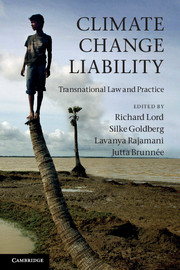Book contents
- Frontmatter
- Contents
- Contributors and Editorial Board members
- Foreword
- Acknowledgements
- Abbreviations
- Part I Legal, scientific and policy aspects
- 1 Introduction
- 2 The scientific basis for climate change liability
- 3 Overview of legal issues relevant to climate change
- 4 Policy considerations
- Part II National laws
- Asia and Pacific
- Africa and the Middle East
- Europe and Eurasia
- North America
- Central and South America
- Selected resources
- Index
- References
3 - Overview of legal issues relevant to climate change
from Part I - Legal, scientific and policy aspects
Published online by Cambridge University Press: 05 June 2012
- Frontmatter
- Contents
- Contributors and Editorial Board members
- Foreword
- Acknowledgements
- Abbreviations
- Part I Legal, scientific and policy aspects
- 1 Introduction
- 2 The scientific basis for climate change liability
- 3 Overview of legal issues relevant to climate change
- 4 Policy considerations
- Part II National laws
- Asia and Pacific
- Africa and the Middle East
- Europe and Eurasia
- North America
- Central and South America
- Selected resources
- Index
- References
Summary
What is ‘climate change liability’?
3.01By its nature, climate change gives rise to myriad potential forms of liability. It is global in geographic terms. Arguments rage about its extent, causes and effects. It potentially affects nearly everyone, and may do so for tens or hundreds of years. It requires addressing at State, regional and individual levels. All feasible responses are complex and costly. It is hard to conceive of a more effective recipe for spawning liabilities of all kinds.
3.02What do we mean in this book, by ‘climate change liability’? The concept of legal liability is well understood. Liability is not usually an absolute, intransitive concept. Liability is usually ‘to’ or ‘in respect of’ another person, so whenever a liability is under discussion one must also consider the corresponding rights. In this book, in one sense we focus on ‘liability’ as something narrower than any obligation arising as a matter of law or legal principle. This book is not about liability arising under treaties or public international law, neither is it concerned with contractual obligations, such as those that might arise under emissions trading schemes or clean development mechanism projects under the Kyoto Protocol. We do however use ‘liability’ in a broader sense than litigation, and also consider ‘liability’ which may fall short of enforceable legal liability. It includes liability to do something or refrain from doing it, as well as liability for compensation. We have sought to focus on liabilities arising from or directly related to climate change and its effects, and not from all activities which may themselves have an impact on, or be impacted by, climate change. This is not a book on environmental law more generally.
- Type
- Chapter
- Information
- Climate Change LiabilityTransnational Law and Practice, pp. 23 - 49Publisher: Cambridge University PressPrint publication year: 2011
References
- 2
- Cited by

